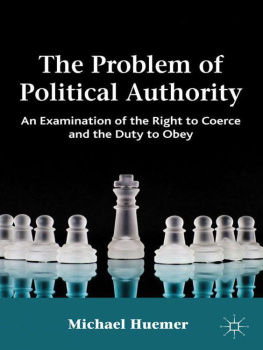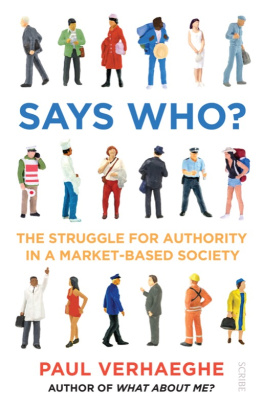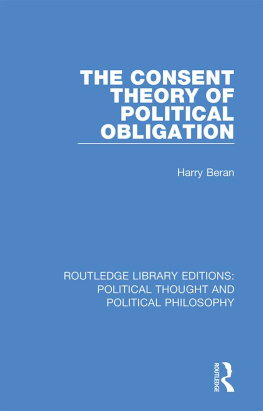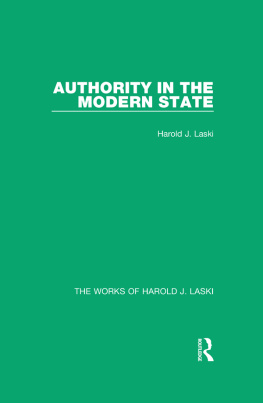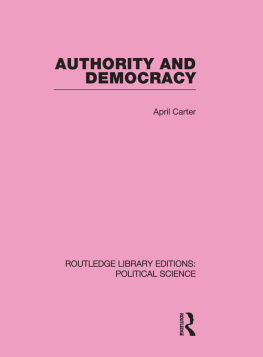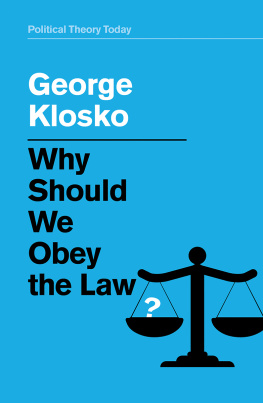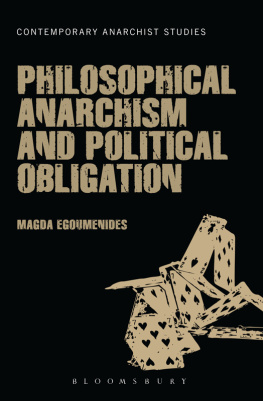The Problem of Political Authority
Also by Michael Huemer
ETHICAL INTUITIONISM
SKEPTICISM AND THE VEIL OF PERCEPTION
The Problem of Political
Authority
An Examination of the Right to Coerce
and the Duty to Obey
Michael Huemer
University of Colorado at Boulder, USA


Michael Huemer 2013
All rights reserved. No reproduction, copy or transmission of this publication may be made without written permission.
No portion of this publication may be reproduced, copied or transmitted save with written permission or in accordance with the provisions of the Copyright, Designs and Patents Act 1988, or under the terms of any licence permitting limited copying issued by the Copyright Licensing Agency, Saffron House, 610 Kirby Street, London EC1N 8TS.
Any person who does any unauthorized act in relation to this publication may be liable to criminal prosecution and civil claims for damages.
The author has asserted his right to be identified as the author of this work in accordance with the Copyright, Designs and Patents Act 1988.
First published 2013 by
PALGRAVE MACMILLAN.
Palgrave Macmillan in the UK is an imprint of Macmillan Publishers Limited, registered in England, company number 785998, of Houndmills, Basingstoke, Hampshire RG21 6XS.
Palgrave Macmillan in the US is a division of St Martins Press LLC, 175 Fifth Avenue, New York, NY 10010.
Palgrave Macmillan is the global academic imprint of the above companies and has companies and representatives throughout the world.
Palgrave and Macmillan are registered trademarks in the United States, the United Kingdom, Europe and other countries.
ISBN: 9781137281647 hardback
ISBN: 9781137281654 paperback
This book is printed on paper suitable for recycling and made from fully managed and sustained forest sources. Logging, pulping and manufacturing processes are expected to conform to the environmental regulations of the country of origin.
A catalogue record for this book is available from the British Library.
A catalog record for this book is available from the Library of Congress.
10 9 8 7 6 5 4 3 2 1
22 21 20 19 18 17 16 15 14 13
Printed and bound in Great Britain by
CPI Antony Rowe, Chippenham and Eastbourne
Contents
Analytical Contents
A private party who performed acts analogous to those of the state would be strongly condemned. The state is not condemned because it is thought to possess authority.
Political authority involves both political obligation and political legitimacy.
The difference between our attitudes toward the government and our attitudes toward vigilantes is due not to a difference in their actions but to a perceived difference in the agents.
An account of authority is needed due to the ethical import of coercion. Many government policies depend on belief in authority.
The usual conception of authority includes five conditions: generality, particularity, content-independence, comprehensiveness, and supremacy.
The best approach to political philosophy involves reasoning from common-sense moral judgments.
The social contract theory hypothesizes a contract requiring citizens to obey the state and the state to protect the citizens.
It is not plausible that such a contract was ever explicitly accepted.
Some argue that we accept the social contract implicitly, through our actions.
Valid contracts satisfy four principles: (1) valid consent requires a reasonable way of opting out; (2) explicit dissent trumps alleged implicit consent; (3) an action can be taken as communicating agreement only if the agent believed that if he did not take the action, the agreement would not have been imposed on him; (4) contractual obligation is mutual and conditional.
There is no way of opting out of the social contract without giving up things one has a right to.
The state does not recognize explicit rejections of the social contract.
The alleged social contract is imposed on citizens almost regardless of what they do.
The state officially renounces any obligations toward individuals.
The traditional social contract theory fails.
Some philosophers seek to base political authority on the claim that citizens would consent to a social contract in some hypothetical scenario.
Hypothetical consent is valid only when actual consent is unavailable, and the hypothetical consent is consistent with the parties actual philosophical beliefs and values.
Some argue that hypothetical consent shows that a political arrangement is reasonable.
There is no reason to think that all reasonable persons could agree on a social contract.
The reasonableness of a contract does not make it obligatory for parties to accept it nor render it permissible to force parties to do so.
John Rawls, the most influential political philosopher, advances a hypothetical social contract theory.
There is no reason to think agreement could be reached in Rawlss hypothetical scenario.
The fairness of a contract does not make it obligatory for parties to accept it nor make it permissible to force parties to do so.
Rawlss scenario embodies some necessary conditions, not sufficient conditions, for reliable moral reasoning. Sufficient conditions would require complete and correct values.
Rawls cannot show that no competing theory satisfies his necessary conditions for acceptable moral reasoning.
Hypothetical consent cannot save the social contract theory.
In common-sense morality, majority will does not generate obligations to comply or entitlements to coerce.
Joshua Cohen articulates conditions for ideal deliberation in a democratic society.
No actual society satisfies any of Cohens conditions.
Even if Cohens conditions were satisfied, they could not ground authority. No deliberative process suffices to erase individuals rights against coercion.
Thomas Christiano derives political obligation from an obligation of justice to support equality and respect others judgment.
Christianos conception of justice must be either absurdly demanding or too weak to generate political obligations.
Obedience to the law is not a meaningful way of supporting democracy.
The democratic interpretation of the value of equality is not uniquely publicly realizable. Either many interpretations of equality can be publicly realized, or none can.
There is no duty to respect others judgment if you know that their judgment is in fact defective.
The state treats citizens as inferiors by forcing citizens to obey its will.
The obligations to support equality and to respect others judgments are not the sort of obligations that it is appropriate to enforce coercively.
The democratic process does not confer authority on its outcomes.
Some argue that we have a duty to promote certain large goods that can only be promoted through obedience to the state.
Government protects us from criminals and foreign governments and provides consistent rules for social coordination.
When one can prevent something very bad with minimal cost, one ought to do so.
An individuals obedience has no impact on the states ability to provide key social benefits.
It is not wrong to do something merely because it would be bad if everyone did it.
Some argue that one must obey the law because disobedience is unfair to other citizens.
For many laws, obedience has no connection with the states ability to provide the crucial benefits that are supposed to justify its existence.
Next page
